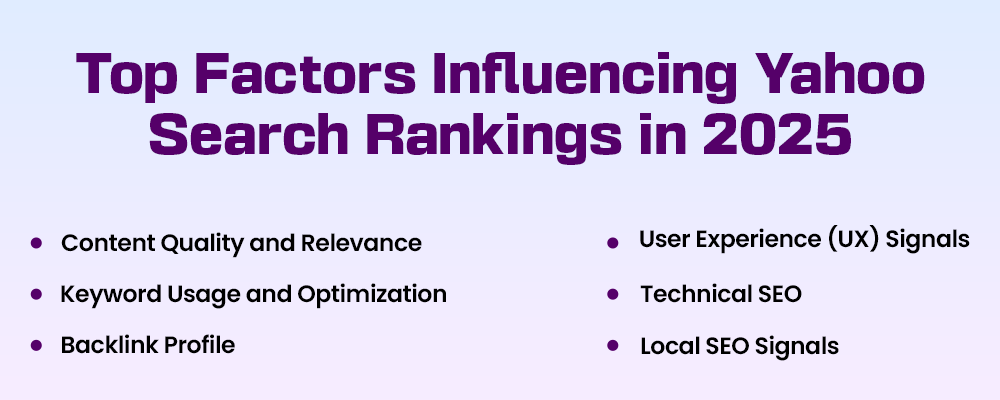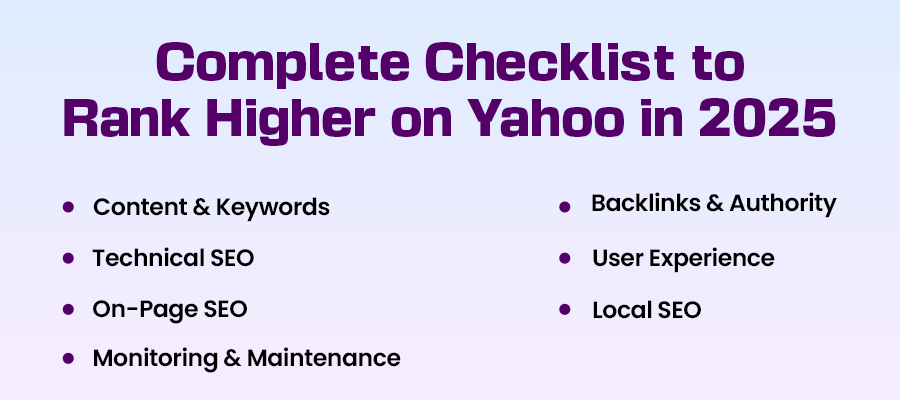In the ever-evolving digital sphere of 2025, diversifying your search engine optimization strategy is no longer optional—it’s essential. While Google dominates, Yahoo Search still commands a valuable niche audience. In fact, businesses offering professional SEO services, ranking your client’s website on Yahoo can unlock new audience segments and incremental revenue. If your goal is to Rank Your Website on Yahoo, this guide offers expert-driven, battle-tested methods to boost rankings and visibility on Yahoo’s platform throughout 2025.
Whether you’re a startup, e-commerce brand, blog, or agency, understanding SEO for Yahoo and how it differs from Google or Bing makes all the difference. This deep-dive will cover everything from the basics of Yahoo Search and why it matters, to the technical underpinnings of its 2025 algorithm. You’ll walk away with a step-by-step approach, a Checklist to Rank on Yahoo, and practical tips from content planning to ongoing optimization.
What is Yahoo Search?
Yahoo Search is a web search engine that provides users with results from a variety of sources including its own index and partner engines, primarily Bing. Launched in 1994, Yahoo has evolved beyond a search engine to become a comprehensive web portal offering news, email, finance, and entertainment. Despite Google’s dominance, Yahoo remains a popular choice for millions, especially in North America and Japan. Yahoo’s search platform integrates traditional web results with rich content like news snippets and multimedia, delivering a unique user experience. Understanding Yahoo Search’s structure is the first step toward crafting SEO strategies tailored specifically for this platform in 2025.
Why Your Website Should Rank on Yahoo?
Although Google leads the search engine market with over 90% share globally, Yahoo still holds a significant niche that marketers cannot overlook. Here’s why your website should rank on Yahoo in 2025:
Diverse Audience Reach
Yahoo maintains millions of active users daily, particularly in demographics that prefer its integrated ecosystem of news, finance, and lifestyle content. Ranking on Yahoo can help you tap into a different user base that might not rely solely on Google for search.
Less Competitive Space
SEO on Google is highly competitive due to its dominance and extensive use by marketers worldwide. Yahoo, powered largely by Bing’s technology but with its own distinct features, offers less competition for keywords, making it easier for new or niche websites to gain visibility.
Integrated Ecosystem Advantage
Yahoo offers more than just search results; it integrates content like Yahoo Finance, Sports, and News. Websites that align with these verticals have higher chances of gaining visibility through Yahoo’s diversified content distribution channels.
Partnerships and Syndication
Yahoo’s search results often feed into other platforms and partner websites, expanding your reach beyond the Yahoo domain itself. Ranking well here means potential exposure on multiple sites.
Voice and Mobile Search
Yahoo has adapted to evolving user behavior by integrating voice search and mobile-friendly results. Optimizing for Yahoo means positioning your site for these growing search trends as well.
Brand Trust and Credibility
Being visible on multiple major search engines, including Yahoo, builds brand authority and credibility. Users often trust brands that appear consistently across platforms.
How Yahoo Search Works in 2025?
Yahoo Search’s workings in 2025 reflect both legacy practices and modern advancements in search technology. Although Yahoo’s organic search results are largely powered by Microsoft’s Bing engine, the platform still applies unique algorithms and content integration layers that differentiate it from Bing and Google. Here’s a closer look at how Yahoo Search functions in 2025:
Hybrid Search Model
Yahoo combines results from Bing’s index with its own curated content. This hybrid approach means that while the core search index is Bing-driven, Yahoo applies additional filters and ranking signals to present tailored results.
Personalization and User Behavior
Yahoo employs machine learning models that analyze user behavior, location, and preferences to personalize search results. In 2025, Yahoo Search uses data signals like click patterns, browsing history, and engagement metrics to adjust rankings dynamically, aiming to increase relevance.
Rich Content and Vertical Integration
Unlike Google’s more universal approach, Yahoo emphasizes vertical content integration. For example, news, sports scores, stock prices, and entertainment updates are prominently featured on search result pages. Yahoo’s algorithms prioritize high-quality, authoritative sources, especially in these verticals, which benefits websites in these niches.
Mobile and Voice Search Optimization
Yahoo has improved support for voice queries and mobile device compatibility. The search engine leverages natural language processing (NLP) to understand conversational queries better and deliver quick, concise answers. Mobile-first indexing is a priority, meaning websites optimized for mobile performance have an edge.
Spam and Quality Controls
Yahoo continues to enforce strict quality guidelines to protect users from spammy, irrelevant content. The platform penalizes manipulative SEO tactics such as keyword stuffing, cloaking, and link schemes. Trustworthy, transparent websites gain better rankings.
Local Search Signals
With an increasing number of searches having local intent, Yahoo incorporates geo-targeting and local business data to rank relevant businesses and services in users’ proximity. Having accurate local listings and location-based SEO boosts your chances of ranking well on Yahoo for local queries.
How Yahoo Ranks Websites: Core Factors in 2025

Ranking your website on Yahoo requires insight into the core factors that influence its search algorithms. Since Yahoo relies heavily on Bing’s technology, the foundational ranking principles align closely but with unique twists:
Content Quality and Relevance
High-quality, authoritative, and relevant content remains paramount. Yahoo values in-depth, well-researched articles that answer user queries comprehensively. Content must be original, engaging, and updated regularly to maintain rankings.
Keyword Usage and Optimization
While keyword stuffing is penalized, strategic use of relevant keywords in titles, headers, meta descriptions, and body content helps Yahoo understand page relevance. Including synonyms and related terms aids semantic understanding.
Backlink Profile
Yahoo considers the quantity and quality of backlinks, favoring links from reputable, authoritative sites. Natural link-building through genuine outreach, partnerships, and quality content promotion is effective.
User Experience (UX) Signals
Factors such as site speed, mobile responsiveness, easy navigation, and low bounce rates contribute to better rankings. Yahoo uses user engagement data like click-through rates and dwell time to assess a site’s value.
Technical SEO
Proper site architecture, clean URLs, secure HTTPS protocol, XML sitemaps, and structured data implementation help Yahoo’s crawlers index and interpret your website accurately.
Local SEO Signals
For local queries, Yahoo prioritizes accurate business listings, consistent NAP (Name, Address, Phone) data, positive reviews, and local backlinks.
How to do SEO for Yahoo: Boosting Your Site’s Visibility & Rank
To optimize your website and rank your website on Yahoo, you need to apply a combination of traditional SEO best practices and Yahoo-specific strategies:
Research Yahoo-Specific Keywords
Though Yahoo’s algorithm aligns with Bing’s, use tools like Microsoft Advertising Keyword Planner to identify high-potential keywords specific to Yahoo users. Tailor your content to these keywords for better targeting.
Optimize Content for User Intent
Understand the intent behind search queries on Yahoo, which tends to favor informative, transactional, and local searches. Create content that directly answers questions and provides clear solutions.
Create Content for Yahoo’s Verticals
If your niche falls under Yahoo’s key verticals like finance, sports, or entertainment, develop content aligned with these areas. Rich, data-driven articles, infographics, and videos perform well.
Enhance Technical SEO for Bing/Yahoo Crawlers
Make sure your site is technically sound — use HTTPS, fast loading speeds, mobile-friendly design, and crawlable site structure. Submit XML sitemaps to Bing Webmaster Tools and Yahoo.
Build Quality Backlinks
Focus on earning backlinks from high-authority sites relevant to your industry. Guest posting, partnerships, and PR campaigns can help build a robust backlink profile.
Leverage Local SEO
For businesses targeting local customers, optimize your Yahoo Local Listings with accurate business info, photos, and reviews.
Use Structured Data Markup
Implement schema.org structured data to help Yahoo better understand your content, potentially enhancing rich snippets in search results.
Optimize for Voice Search
Incorporate natural language and conversational keywords, as Yahoo supports voice search features. Answer FAQs clearly and concisely.
Monitor and Analyze Performance
Use Bing Webmaster Tools and Yahoo analytics to track your site’s performance. Analyze traffic, rankings, and user engagement to refine your SEO strategy.
Avoid Black-Hat SEO
Stay clear of spammy tactics like keyword stuffing, cloaking, and unnatural link schemes to avoid penalties.
By consistently applying these SEO for Yahoo strategies, you can boost your site’s visibility, drive targeted traffic, and achieve sustainable rank on Yahoo in 2025.
Essential Checklist to Rank on Yahoo in 2025

To make sure you cover all bases, here’s a practical Checklist to rank on Yahoo that combines SEO best practices and Yahoo-specific tips:
Content & Keywords
- Conduct keyword research focusing on Yahoo/Bing search patterns.
- Create original, high-quality, and user-focused content.
- Use naturally in titles, headers, and meta descriptions.
- Update content regularly to maintain freshness.
- Target content aligned with Yahoo’s verticals (news, finance, sports, entertainment).
Technical SEO
- Ensure your website uses HTTPS.
- Optimize site speed to load within 3 seconds.
- Implement mobile-first design and test responsiveness.
- Create a clean and crawlable site architecture.
- Submit XML sitemap to Bing Webmaster Tools.
- Fix broken links and 404 errors promptly.
- Use robots.txt correctly to guide crawler access.
On-Page SEO
- Use descriptive, keyword-rich title tags.
- Write compelling meta descriptions with target keywords.
- Structure content with proper header tags (H1, H2, H3).
- Optimize images with alt text containing keywords.
- Implement schema markup for rich snippets.
Backlinks & Authority
- Build backlinks from reputable, relevant sites.
- Avoid link farms and paid link schemes.
- Promote content through guest posts and PR.
- Engage with influencers in your niche for outreach.
User Experience
- Ensure easy navigation with intuitive menus.
- Minimize pop-ups and intrusive ads.
- Improve dwell time with engaging multimedia content.
- Optimize for accessibility standards.
Local SEO
- Complete Yahoo Local Business Profile accurately.
- Ensure consistent NAP (Name, Address, Phone) data across all listings.
- Encourage positive customer reviews.
- Use local keywords in content and metadata.
Monitoring & Maintenance
- Track rankings and traffic via Bing Webmaster Tools.
- Analyze user behavior and bounce rates.
- Adjust SEO tactics based on data insights.
- Regularly audit your site for SEO issues.
Following this checklist to rank on Yahoo can greatly improve your chances of success by covering all critical SEO aspects tailored for Yahoo’s ecosystem in 2025.
Final Thoughts
While Google remains the leader in search, Yahoo still offers a valuable platform to expand your website’s reach and diversify your traffic streams. Understanding how Yahoo Search works, what factors influence its rankings, and implementing dedicated SEO strategies will give you a competitive edge. By following the essential checklist to rank on Yahoo and consistently optimizing your content, technical setup, and user experience, you can boost your site’s visibility and drive meaningful traffic from this often overlooked but impactful search engine. In 2025, investing in SEO for Yahoo is a smart, strategic move for any website owner or marketer.
FAQs
Is Yahoo still relevant for SEO in 2025?
Yes, Yahoo remains relevant, especially for reaching niche audiences and users who prefer its integrated services. Its unique search ecosystem and partnership with Bing make it a valuable platform for diversified SEO.
How is Yahoo different from Bing and Google?
Yahoo uses Bing’s search technology but applies its own content filters and vertical integrations, making its results a hybrid of Bing’s index and Yahoo’s curated content. Google’s algorithm is entirely proprietary and more dominant globally.
How long does it take to rank on Yahoo?
Ranking time varies but typically takes 3-6 months of consistent SEO effort, depending on competition, site authority, and content quality.
Does Yahoo prioritize its own content?
Yes, Yahoo often integrates its own vertical content such as news and finance but also ranks external sites based on relevance and quality.
Can I optimize for Yahoo without touching my Google SEO?
To some extent, yes. While many SEO fundamentals overlap, focusing on Bing/Yahoo keyword research, local SEO, and technical factors can tailor your efforts specifically for Yahoo.
Is structured data important for Yahoo?
Absolutely. Structured data helps Yahoo better understand and display your content, improving chances of rich snippets and enhanced visibility.
Useful Resource: Effective SEO Strategies






What do you think?
It is nice to know your opinion. Leave a comment.